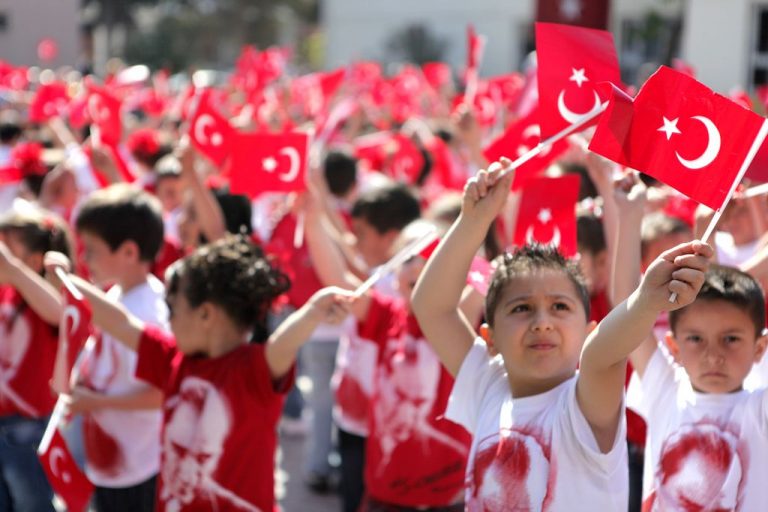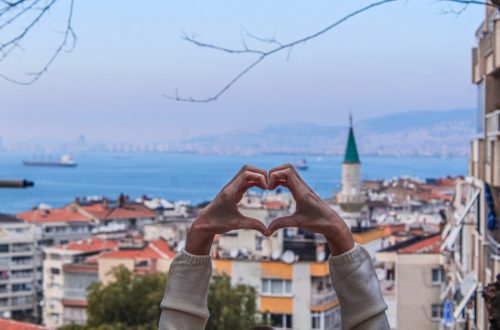
Turkish holidays: The dates, Meaning and Shop hours)
Here is a list of Turkish holidays, with their dates and meanings.
Turkish Holidays are divided into two categories:
1. Turkish Holidays with a fixed date
2. Turkish Holidays based on the Islamic lunar calendar
First I will tell you the dates– and then, their significance:
Will shops and offices be open? How do the holidays affect daily life for tourists?
A) Turkish Holidays with a fixed date
January 1st – New Year’s Eve: Only celebrated in the big cities.
April 23 – National Sovereignty and Children’s Day: Children’s dance performances.
May 1st – Labour Day. It is hardly ever celebrated in Turkey.
May 19 – Youth and Sports Day: performances by youth groups and sports clubs.
July 15 – Memorial Day of the prevented military coup on July 15, 2016.
August 30 – Victory Day (Zafar Bayrami): Public holiday with marches and military parades. (All offices are closed)
October 29 – Republic Day (Cumhuriyet Bayrami): Public holiday with marches and military parades. (All offices are closed)
B) Turkish Holidays that are based on the Islamic lunar calendar
The date of the festivities is moved forward 10 or 11 days each year, because the holidays are based on the Islamic lunar calendar. It is calculated differently than the Gregorian calendar.
Ramadan (Ramazan): In the fasting month of Ramadan, believers do not eat or drink anything until sunset.
Sugar Festival/Feast of the Breaking of the Fast (Şeker Bayramı/Ramazan Bayramı): this festival celebrates the end of the fasting month of Ramadan. It lasts three days.
Kurban Bayrami: the highest religious festival in Turkey. It may last anywhere from five to 10 days, depending on the region.
Meaning of the Turkish holidays celebrated …
… and on which occasion they are celebrated.
As a rule:
Just like in any other country, these holidays commemorate important religious or national events.
1. Ramadan (Ramazan): The month of fasting
During the month of fasting, devout Muslims do not eat anything until sunset. Smoking, drinking, alcohol and sex are also prohibited.
Ramadan has little influence on the daily life of tourists in the tourist resorts.
As a traveller, you should still show consideration for believers. Walking down the street with a large kebab for lunch does not go over too well.
It doesn’t really matter if you are on the beach or in the hotels. There, you are mostly surrounded by other tourists.
In small villages, shops and bars are often closed during the day. At sunset they are completely overflowing with customers.
2. Sugar Festival/Festival of Breaking the Fast (Şeker Bayramı/Ramazan Bayramı)
The fasting month of Ramadan is concluded with the “Sugar Festival”. It usually lasts three days.
The Seker Festival is comparable to Christmas in Christianity. Children are given sweets; new clothes are bought and people indulge in culinary delights.
People give more generously to the poor in honour of this celebration.
On the day before Seker Bayrami, public life comes to a complete standstill. This is not a problem for you if you are a tourist – because everything flows as normally as possible in the seaside resorts.
3. Festival of Sacrifice (Kurban Bayramı)
The Festival of Sacrifice is the highest religious festival in Turkey. It usually lasts five days. In some parts of Turkey it can continue for up to 10 days.
This festival commemorates the sacrifice of Abraham. In Islam it is held holy as a symbol of submitting our will for God’s sake.
For the Festival of Sacrifice, animals are slaughtered everywhere – in the traditional way. This arouses astonishment among tourists when they see sheep or other animals being slaughtered on the streets.
The Festival of Sacrifice begins on the 10th day of the month of election according to the Islamic calendar. It is also the month known as the Hajj in which people usually set out on a pilgrimage to Mecca.
The animal meat is partly consumed by the butchers’ families. The other part goes to friends or poor people.
4. New Year (Yılbaşı)
January 1st: The Gregorian calendar has only been in effect here since the end of the Ottoman Empire. For this reason, New Year is not so strongly anchored within the Turkish culture.
New Year celebrations take place in the country’s major cities – especially on the west coast, such as: Istanbul, Izmir, Bursa and Antalya.
On the south coast, New Year is decisively planned on the calendar. This is due to the long-term vacationers in the tourist resorts who occupy the hotel resorts during winter.
New Year in Turkey doesn’t affect anyone’s daily life .
5. Day of National Independence and Children (Ulusal Egemenlik ve Çocuk Bayramı)
April 23: This Turkish holiday commemorates the first parliament in Turkey. It met on April 23, 1920 under the leadership of Mustafa Kemal.
Ataturk dedicated this day to the children – as they are the future of Turkey.
The goal of Children’s Day is that children of all nations and ethnicities come together. They should play peacefully with each other and contribute to the understanding of other cultures.
On this day, April 23, you can expect plenty of parades and celebrations to be held in stadiums. Children from other countries are cordially invited to the celebrations and encouraged to take part by wearing traditional costumes from their homelands.
In 1979, Children’s Day was renamed “International Children’s Day”. Since then, 30,000 children from 100 nations have taken part in it, every year.
6. Ataturk Memorial Day (Ataturk’ü Anma) and Youth and Sports Day (Gençlik ve Spor Bayramı)
May 19: After the Ottoman Empire collapsed, the struggle for independence began on May 19, 1919 under Mustafa Kemal Ataturk.
After the First World War, large parts of Turkey were occupied by the victorious powers. After the war of 1922 was finished, the Turkish Republic was officially proclaimed on October 29, 1923.
This Turkish holiday is mainly dedicated to sports and youth.
It is celebrated in all the country’s major stadiums. School classes take part in the celebrations as well as performing groups wearing traditional clothes.
Wrestling matches take place in the small villages of Eastern Anatolia. That is considered to be something like the national sport in those parts.
Ceremonies and festivals are held across the country in memorial of the war for independence and Ataturk.
7. Victory Day in the Turkish Liberation War (Zafer Bayramı)
August 30th: The decisive victory in the Turkish War for Liberation (Başkomutanlık Meydan Savaşı) is commemorated.
This refers to the war between Turkey and the occupying powers after the First World War. The war lasted from 1919 to 1923.
The war was directed against Armenia, Greece, France, Italy and Great Britain.
Among them, Greece was particularly important.
In those days, a large number of Greeks lived along the Aegean coast. They made up a good portion of the population in many large cities and regions.
In the last great battle, the region surrounding the province of Izmir was fought over. Izmir, which is now the third largest city in Turkey, was then called Smyrna.
The battle for Smyrna/Izmir took place from August 26th to October 30th.
The general on the Turkish side was Mustafa Kemal Ataturk – founder of the Turkish Republic.
On Victory Day, ceremonies are held at Ataturk Mausoleum in Ankara – the Antibakir.
Military parades take place in the big cities. The Turks hang up even more flags than usual.
Besides the flags, another national symbol of Turkey exists: portraits of Ataturk. They are displayed everywhere on that day, including on the streets.
8. Veteran’s Day (Gaziler Günü)
September 19: This is not a public holiday. In other words, all offices and businesses are open as usual.
Veterans and heroes from the past war are remembered.
In particular, Veteran’s Day recalls the war between Greece and Turkey after the end of World War I, as well as the later war between Greece and Turkey over the island of Cyprus.
10th Republic Day, National Turkish Holiday (Cumhuriyet Bayramı)
October 29th: This day commemorates the proclamation of the Turkish Republic in 1923.
Celebrations begin on October 28th at 1pm and end on October 29th.
This national holiday is celebrated in Turkey in a big way. There are all kinds of parades, torchlight parades and street parties held throughout the country.
In particular, people reminisce about the following:
The capital of Turkey was relocated from Istanbul to Ankara with the proclamation of the Republic.
The caliphate was abolished in Turkey. The sultan was ousted from rule in 1922.
Of course, Ataturk is also remembered on this national holiday.
Other religious holidays
These holidays don’t have much of an impact on daily life.
You notice them when you see that the mosques are lit up in the evenings and believers go in to pray.
These dates are based on the Islamic calendar. That’s why they are on a different day each year.
- Birthday of the Prophet (Mevlid-i Serif)
- Night of the Prophet’s conception (Regaip Kandili)
- Heavenly Journey (Mirac Kandili)
- After forgiveness (Berat Kandili)
Turkish Holidays that are restricted to certain occupational groups or regions:
- Liberation Day in Izmir
- Liberation day in Urfa
- Liberation day in Eskisehir
- Teachers Day
- Libraries Week
- Thanksgiving Day
What was your experience of the Turkish holidays?
Were all the shops open? Do you even notice the holidays?




